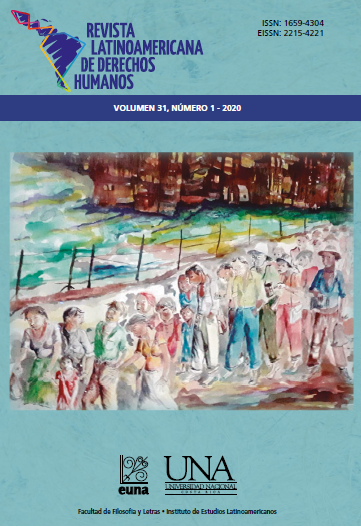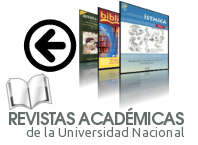Testimonio: Sólo eran estudiantes
DOI:
https://doi.org/10.15359/rldh.31-1.3Keywords:
Migration, Nicaragua, Structural violence, TestimonyAbstract
We will bring the reader closer to the reality of a migrant person, raising awareness through narration as the sole protagonist, thus the interviewer is only a means to visualize the realities that the subject shares with us from his own voice. For these reasons, the testimony as such is developed from a theoretical analysis of the historical context and realities in which it is framed. In this sense, the delivery of the testimony -testimony itself- is not altered, therefore it is organized in subtopics, to guide us as an applied analysis of the themes. Regarding the migratory themes addressed throughout the testimony, these are mainly oriented around the “Teoría y enfoque de la migración internacional” (Cerdas, 2019)(translated as “Theory and approach of international migration”) seen from the factors of expulsion and attraction that determine the migration of the interviewee; through the “La orientación identitaria del migrante: los roles de subjetividad, aculturización, asimilación y homogenización” (Cerdas, 2019) (translated as “The identitarian orientation of the migrant: the roles of subjectivity, acculturation, assimilation, and homogenization”), and lastly, through the implications of “Globalización, migración y espacios fronterizos: fronteras reales y fronteras imaginarias en las migraciones en América Latina” (Cerdas, 2019) (translated as “Globalization, migration and border spaces: real borders and imaginary borders in migrations in Latin America”) in the deconstruction of the identity and sense of belonging to a territory. Structural violence cuts across all strata of life in societies; Latin American states, and especially Central American countries have been the hardest hit in terms of colonial heritage. All these factors, including political instability, encourage individuals, especially the younger population who are being systematically violated, persecuted, imprisoned and murdered; to seek safeguard for their lives and that of their families.
References
Acedo, N. (2017). El género testimonio en Latinoamérica: Aproximaciones críticas en busca de su definición, genealogía y taxonomía. Latinoamérica. Revista de Estudios Latinoamericanos, (64) 39-69. https://doi.org/10.22201/cialc.24486914e.2017.64.56863
Caamaño, C. (2010). Entre "arriba" y "abajo": La experiencia transnacional de la migración de costarricenses hacia Estados Unidos. Editorial de la Universidad de Costa Rica.
Cruz, G. y Díaz, D. (2018). Migraciones en América Latina: Explicaciones desde la violencia. Instituto Mexicano de Doctrina Social Cristiana.
Globalización, migración y espacios fronterizos: Fronteras reales y fronteras imaginarias en las migraciones en América Latina. (2019) En E, Cerdas (Comp.), ELD705: Política y procesos migratorios en América Latina. Clase 9 mayo. Universidad Nacional de Costa Rica.
La migración internacional. (2019) En E, Cerdas (Comp.), ELD705: Política y procesos migratorios en América Latina. Clase 21 febrero. Universidad Nacional de Costa Rica.
La orientación identitaria del migrante: Los roles de subjetividad, aculturización, asimilación, homogenización. (2019) En E, Cerdas (Comp.), ELD705: Política y procesos migratorios en América Latina. Clase 14 marzo. Universidad Nacional de Costa Rica.
Randall, M. (2002). ¿Qué es, y como se hace un testimonio? En Beverly, J y Achúgar, H. La voz del otro. 2 ed. Guatemala, Universidad Rafael Landivar. Pp. 33-57.
Ramírez, J. (2007). El chiste de la alteridad: La pesadilla de ser el otro. Editorial de la Universidad de Costa Rica, San José.
Sierra, L. (2008). Retos de las ciencias sociales en Nicaragua. Revista Encuentros, 40(79), 52-62. https://doi.org/10.5377/encuentro.v0i79.3648
Downloads
Published
How to Cite
Issue
Section
License
El material que se publica en esta Revista está bajo una licencia “Creative Commons” 3.0 Costa Rica (CC, Reconocimiento-NoComercial-SinObraDerivada 3.0 Costa Rica (CC BY-NC-ND 3.0 CR) . Esto significa que el material publicado en la revista se puede compartir (copiar y distribuir) en cualquier medio o formato considerando que se debe reconocer de forma adecuada la autoría del material y la fuente, no puede utilizarse con fines comerciales y no se aceptan las obras derivadas (remezclar, transformar o crear a partir del material).








